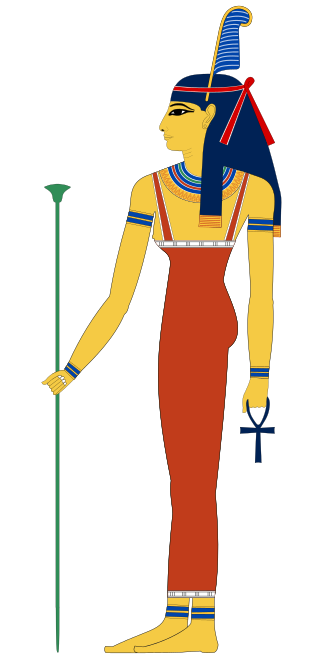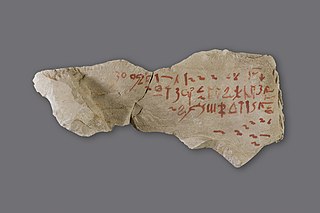Related Research Articles

The Bible is a collection of religious texts and scriptures that are held to be sacred in Christianity, and partly in Judaism, Samaritanism, Islam, the Baháʼí Faith, and other Abrahamic religions. The Bible is an anthology originally written in Hebrew, Aramaic, and Koine Greek. The texts include instructions, stories, poetry, prophecies, and other genres. The collection of materials that are accepted as part of the Bible by a particular religious tradition or community is called a biblical canon. Believers in the Bible generally consider it to be a product of divine inspiration, but the way they understand what that means and interpret the text varies.
The Book of Proverbs is a book in the third section of the Hebrew Bible and the Christian Old Testament traditionally ascribed to King Solomon and his students. When translated into Greek and Latin, the title took on different forms: in the Greek Septuagint (LXX), it became Παροιμίαι ; in the Latin Vulgate, the title was Proverbia—from which the English name is derived.

Maat or Maʽat comprised the ancient Egyptian concepts of truth, balance, order, harmony, law, morality, and justice. Maat was also the goddess who personified these concepts, and regulated the stars, seasons, and the actions of mortals and the deities who had brought order from chaos at the moment of creation. Her ideological opposite was Isfet, meaning injustice, chaos, violence or to do evil.

Wisdom literature is a genre of literature common in the ancient Near East. It consists of statements by sages and the wise that offer teachings about divinity and virtue. Although this genre uses techniques of traditional oral storytelling, it was disseminated in written form.

Instruction of Amenemope is a literary work composed in Ancient Egypt, most likely during the Ramesside Period ; it contains thirty chapters of advice for successful living, ostensibly written by the scribe Amenemope son of Kanakht as a legacy for his son. A characteristic product of the New Kingdom "Age of Personal Piety", the work reflects on the inner qualities, attitudes, and behaviors required for a happy life in the face of increasingly difficult social and economic circumstances. It is widely regarded as one of the masterpieces of ancient near-eastern wisdom literature and has been of particular interest to modern scholars because of its similarity to the later biblical Book of Proverbs.
There is no scholarly consensus as to when the canon of the Hebrew Bible was fixed. Rabbinic Judaism recognizes the twenty-four books of the Masoretic Text as the authoritative version of the Tanakh. Of these books, the Book of Daniel of Ketuvim has the most recent final date of composition. The canon was therefore fixed at some time after this date. Some scholars argue that it was fixed during the Hasmonean dynasty, while others argue it was not fixed until the second century CE or even later.
The Book of Sirach, also known as The Wisdom of Jesus the Son of Sirach or Ecclesiasticus, is a Jewish literary work, originally written in Biblical Hebrew. The longest extant wisdom book from antiquity, it consists of ethical teachings, written approximately between 196 and 175 BCE by Yeshua ben Eleazar ben Sira, a Hellenistic Jewish scribe of the Second Temple period.

Proverbs 1 is the first chapter of the Book of Proverbs in the Hebrew Bible or the Old Testament of the Christian Bible. The book is a compilation of several wisdom literature collections, with the heading in 1:1 may be intended to regard Solomon as the traditional author of the whole book, but the dates of the individual collections are difficult to determine, and the book probably obtained its final shape in the post-exilic period. This chapter is a part of the first collection of the book.

Proverbs 3 is the third chapter of the Book of Proverbs in the Hebrew Bible, or the Old Testament of the Christian Bible. The book is a compilation of several wisdom literature collections, with the heading in 1:1 may be intended to regard Solomon as the traditional author of the whole book, but the dates of the individual collections are difficult to determine, and the book probably obtained its final shape in the post-exilic period. This chapter is a part of the first collection of the book.

Proverbs 2 is the second chapter of the Book of Proverbs in the Hebrew Bible or the Old Testament of the Christian Bible. The book is a compilation of several wisdom literature collections, with the heading in 1:1 may be intended to regard Solomon as the traditional author of the whole book, but the dates of the individual collections are difficult to determine, and the book probably obtained its final shape in the post-exilic period. This chapter is a part of the first collection of the book.

Proverbs 4 is the fourth chapter of the Book of Proverbs in the Hebrew Bible or the Old Testament of the Christian Bible. The book is a compilation of several wisdom literature collections, with the heading in 1:1 may be intended to regard Solomon as the traditional author of the whole book, but the dates of the individual collections are difficult to determine, and the book probably obtained its final shape in the post-exilic period. This chapter is a part of the first collection of the book. The Jerusalem Bible entitles this chapter, "On choosing wisdom".

Proverbs 7 is the seventh chapter of the Book of Proverbs in the Hebrew Bible or the Old Testament of the Christian Bible. The book is a compilation of several wisdom literature collections; the heading in 1:1 may be intended to regard Solomon as the traditional author of the whole book, but the dates of the individual collections are difficult to determine, and the book probably obtained its final shape in the post-exilic period. This chapter is a part of the first collection of the book.

Proverbs 25 is the 25th chapter of the Book of Proverbs in the Hebrew Bible or the Old Testament of the Christian Bible. The book is a compilation of several wisdom literature collections, with the heading in Proverbs 1:1 may be intended to regard Solomon as the traditional author of the whole book, but the dates of the individual collections are difficult to determine, and the book probably obtained its final shape in the post-exilic period. This chapter is the last part of the fifth collection of the book, so-called "the Second Solomonic Collection."

Proverbs 26 is the 26th chapter of the Book of Proverbs in the Hebrew Bible or the Old Testament of the Christian Bible. The book is a compilation of several wisdom literature collections, with the heading in 1:1 may be intended to regard Solomon as the traditional author of the whole book, but the dates of the individual collections are difficult to determine, and the book probably obtained its final shape in the post-exilic period. This chapter is the last part of the fifth collection of the book, so-called "the Second Solomonic Collection."

Proverbs 27 is the 27th chapter of the Book of Proverbs in the Hebrew Bible or the Old Testament of the Christian Bible. The book is a compilation of several wisdom literature collections, with the heading in 1:1 may be intended to regard Solomon as the traditional author of the whole book, but the dates of the individual collections are difficult to determine, and the book probably obtained its final shape in the post-exilic period. This chapter is the last part of the fifth collection of the book, so-called "the Second Solomonic Collection."

Proverbs 28 is the 28th chapter of the Book of Proverbs in the Hebrew Bible or the Old Testament of the Christian Bible. The book is a compilation of several wisdom literature collections, with the heading in 1:1 may be intended to regard Solomon as the traditional author of the whole book, but the dates of the individual collections are difficult to determine, and the book probably obtained its final shape in the post-exilic period. This chapter is the last part of the fifth collection of the book, so-called "the Second Solomonic Collection."

Proverbs 29 is the 29th chapter of the Book of Proverbs in the Hebrew Bible or the Old Testament of the Christian Bible. The book is a compilation of several wisdom literature collections, with the heading in 1:1 may be intended to regard Solomon as the traditional author of the whole book, but the dates of the individual collections are difficult to determine, and the book probably obtained its final shape in the post-exilic period. This chapter is the last part of the fifth collection of the book, so-called "the Second Solomonic Collection."

Proverbs 23 is the 23rd chapter of the Book of Proverbs in the Hebrew Bible or the Old Testament of the Christian Bible. The book is a compilation of several wisdom literature collections, with the heading in 1:1 may be intended to regard Solomon as the traditional author of the whole book, but the dates of the individual collections are difficult to determine, and the book probably obtained its final shape in the post-exilic period. This chapter specifically records "the sayings of wise".

Proverbs 22 is the 22nd chapter of the Book of Proverbs in the Hebrew Bible or the Old Testament of the Christian Bible. The book is a compilation of several wisdom literature collections, with the heading in 1:1 may be intended to regard Solomon as the traditional author of the whole book, but the dates of the individual collections are difficult to determine, and the book probably obtained its final shape in the post-exilic period. This chapter records parts of the second and third collection of the book.

Proverbs 13 is the thirteenth chapter of the Book of Proverbs in the Hebrew Bible or the Old Testament of the Christian Bible. The book is a compilation of several wisdom literature collections, with the heading in 1:1 may be intended to regard Solomon as the traditional author of the whole book, but the dates of the individual collections are difficult to determine, and the book probably obtained its final shape in the post-exilic period. This chapter is a part of the second collection of the book.
References
- ↑ Aitken, K. T., 19. Proverbs in Barton, J. and Muddiman, J. (2001), The Oxford Bible Commentary Archived 2017-11-22 at the Wayback Machine , p. 418
- ↑ Collins, John (2014). Introduction to the Hebrew Bible and Deutero-Canonical books. Minneapolis: Fortress Press. p. 509. ISBN 978-1-4514-8436-6.
- ↑ James Henry Breasted, The Dawn of Conscience: The Sources of Our Moral Heritage in the Ancient World (New York: Charles Scribner's Sons, 1961), p. 371.
- ↑ Breasted, The Dawn of Conscience, footnote p. 377-78.